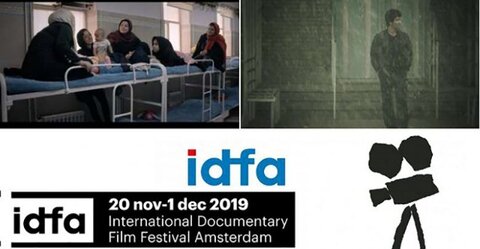Iran (IMNA) Mehrdad Oskouei's feature-length documentary "Sunless Shadows" received the International Documentary Film Festival Amsterdam (Idfa) top prize for best directing (€ 5.000). His film focuses on young women in jail for the murder of a man.
Oskouei is one of Iran’s most prestigious docmakers whose films mostly focus on different issues of the day in Iran including the limitations women encounter, problems orphans experience as well as the cultural and moral dilemmas rural and urban youth face, etc. Iranian documentary filmmakers have recently gained worldwide recognition during the last years due to the portrayal of the current issues and daily challenges as well as their unique cinematography.
2019 International Documentary Film Festival in Amsterdam opened this year with the "Sunless Shadow" which is about some teenage girls imprisoned for committing serious crimes including the murders of male relatives. The festival’s artistic director, Orwa Nyrabia admired Oskouei’s film for supporting women in his country. He reiterated, "It’s a film that is very authentic and sincere in its approach to its characters and its story. And I think this is a film that will be very, very accessible for international audiences – even though it is also very, very Iranian at the same time. This is a quality that one finds in very few films."
In Iran also there is a well-known festival called Iran International Documentary Film Festival, also known as the Cinema Verite which has always created a panel for local and international domakers to showcase their films convey their messages to the audience across the globe through their works.
Oskouei's interview with Variety prior to the film’s world premiere comes as following:
How did you get involved with these girls?
A few years ago, I began to think about how I could start my new film. I was thinking of a film about prison and prisoners. It was 2006, and everyone was talking about the football World Cup. And I was thinking about all the kids in prison—how do they feel when people of the same age are free? I focused on this topic and after six months [the prison] gave me permission for shooting there. In that moment, I knew my story would not be finished within just one film, so I decided to make three films about these kids.
How did that lead to “Sunless Shadows”?
First I made two films about boys under 15 years old in rehabilitation center [2007’s “It’s Always Late For Freedom” and 2011’s “The Last Days of Winter”], and then one more film about girls under 18 years old, which was called “Starless Dreams” [in 2016]. It was while I was making this film that I discovered the stories of these modern girls who had killed a father, or a husband, or a brother-in-law, and so I decided to make a film about these characters and for these characters.
For me it’s also very important because my father and my grandfather were prisoners. One hundred years ago my grandfather was a prisoner during the Reza Shah time, and 52 years ago my father was a political prisoner under the Shah, so I really wanted to know about the prison landscape.
Why did you want to tell a story about women?
For me, it’s very important, because I want to give a voice to voiceless people in my film. Ever since the revolution here [in Iran], we haven’t been able tell the most truthful stories about the situation for women in my country, and I decided to make a film about women and children for this reason. If anything is going to change in the future, and if anything is going to change the future of our world, I think children and women will be the ones to bring about that change.
What was it about these particular women that interested you?
These people who committed a crime… for me, they are not criminals simply because they are bad women or bad children. When I started researching them I began to see they were very innocent, very beautiful, and very smart. And the more I researched them, the more I began to think that it’s actually us that [has caused] the problem—they are in prison because of us, because of society, not just because they themselves did something bad.
How did you get their trust?
Well, I had to get the trust of the authorities first and then the characters I wanted to film. The authorities didn’t trust me, so I wrote to them and said, “My film is not about authority, it’s about human beings, about their suffering, their dreams, their pain. It’s everything about being a human being, not authority or power.” Still, they kept me waiting for permission, because never before had a camera gone into a women’s prison. We have seen fictional feature films set in that world, but not documentaries, not in real life.
What about the girls themselves?
When I told them I wanted to make film about girls in prison, they asked me, “Why do you want to make film about us?” I said, “Because I want to stop more girls like you going to prison.” And after a second’s pause, they asked me again, “Could you please tell us in one sentence why you want to make a film about us?” I said, “I have a daughter the same age as you.” After that, they gave me permission, and they began to trust me.


Your Comment